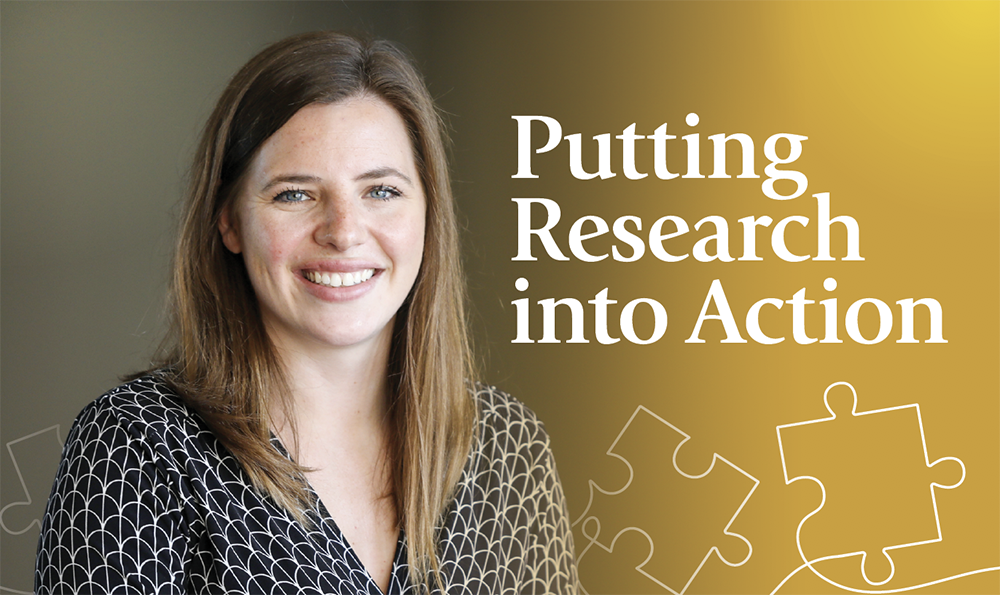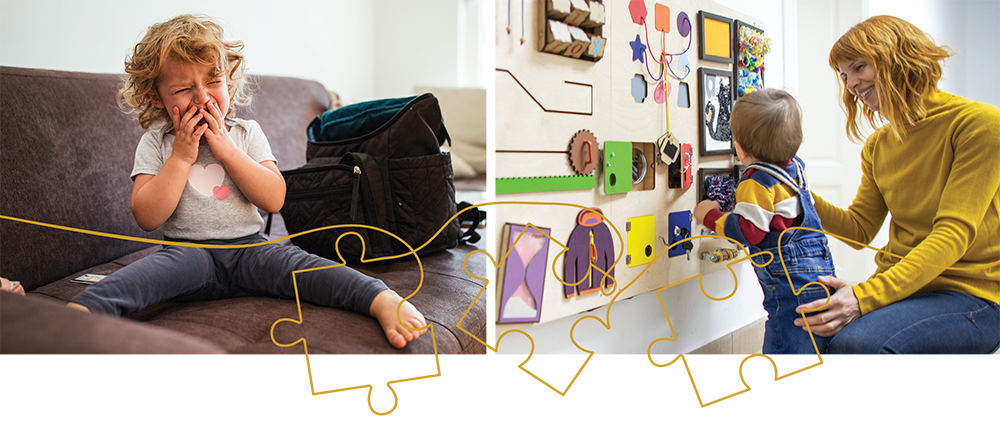COVER STORY: Putting Research into Action
Every parent has experienced the temper tantrum of a 2-year-old. But when a child’s challenging behavior is so severe and consistent that it affects daily life and interactions, parents and educators struggle with what to do.
Such situations are often the case for children with developmental disabilities such as Autism Spectrum Disorder, and typical strategies are usually insufficient.
The good news is that researchers in the field of Applied Behavior Analysis have developed effective behavior-intervention strategies, and a new project in the Department of Educational Psychology aims to share that knowledge more broadly with professionals, caregivers, and parents.
Dr. Stephanie Gerow, assistant professor, has earned a coveted grant from the U.S. Department of Education to fund research providing early-childhood professionals with behavioral-intervention training for children with developmental disabilities. The award — an Institute of Education Sciences (IES) Early Career Development and Mentoring Award — provides $493,412 in research funding and is the first of its kind awarded to a Baylor faculty member.
“What we find is that kids with developmental disabilities are more likely to engage in problem behavior, which can include aggression or property destruction. And those kids are at a higher risk for having lifelong difficulties without interventions to improve those problem behaviors,” Gerow said. “Early intervention can lead to better education and social outcomes for children.”
Gerow added, “For the community agencies that provide important services to children with developmental disabilities, there has been little in the way of research or partnerships to develop sustainable programs to reduce problem behavior. I’m excited that this grant will enable us to partner with these agencies and pursue a standardized protocol for organizations that can improve trajectories for children.”
Through the project, Gerow and her team will provide training to the staff of community agencies that serve young children with developmental disabilities — 3 years old and younger — and their families. Over the four years of the grant, the team will eventually serve about 65 families and develop training materials that can be implemented on an ongoing basis.
“There’s a great deal of research in evidence-based practices to reduce problem behavior; it’s a well-established field,” Gerow said. “The challenge has been to bridge the gap from research to practice.”
Many different therapists may work with a young child with developmental delays — a physical therapist, speech therapist, or early-intervention specialist. But behavior intervention is the specialty of Applied Behavior Analysis (ABA), and most non-ABA therapists have not had access to the training.
“For these interventions, we identify the purpose of the problem behavior and then implement an intervention based on addressing that purpose,” Gerow explained.
Through the project, an ABA-trained therapist will work with early-childhood service agencies to assess problem behavior and develop a plan. The research team will provide professional development and create a model for continued training for early-care providers and therapists. “We will develop a system that they can continue to use,” Gerow said.
“Dr. Gerow’s work is consequential and much needed,” said Dean of the School of Education Dr. Shanna Hagan-Burke, who has engaged in similar research over the years to help teachers more effectively support children with challenging behavior. “She is taking evidence-based practice and making that knowledge more available and usable to those who serve children on a daily basis.”
The Early Career and Mentoring Award is highly competitive and prestigious; this year, the U.S. Department of Education awarded it to only five special education scholars nationwide.
“Researchers are only eligible for the first three years of their career, and the process to submit is intensive,” Hagan-Burke noted. “Dr. Gerow’s receipt of this federal award is a testament to the relevance and rigor of her research agenda.”
An added element of this initial career grant is the “mentoring” aspect. Gerow has established an advisory board of nationally recognized scholars and collaborators.
“Part of the experience is to give me a boost in launching my career and research agenda,” Gerow said. “I get to learn from a panel of expert mentors, and I’ve been star struck by the chance to work with them.”
Gerow’s advisory team is working via video conference, in addition to email and other communications. Gerow is also working with Baylor School of Education experts. She took a qualitative research methods course with Dr. Tony Talbert in the Department of Curriculum & Instruction, and her departmental colleague Dr. Tonya Davis is part of her advisory team and a mentor for the project.
In addition to building Gerow’s career, the grant also provides valuable experiences to graduate students in Baylor’s ABA programs, who will be helping develop and implement the trainings. Baylor SOE offers MSEd, MA, and PhD degrees with a specialization in Applied Behavior Analysis. During the grant’s first two years, Gerow’s team is reviewing literature, identifying strategies validated by research, and developing the program. Implementation and testing of the training methods with partner agencies will begin in the program’s third and fourth years.

